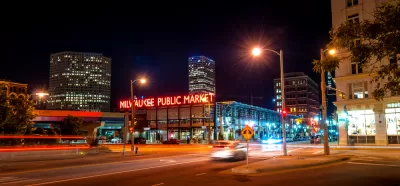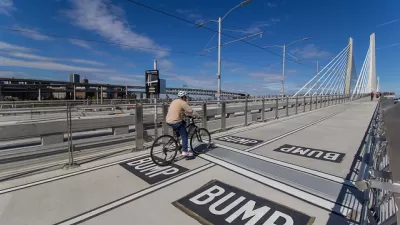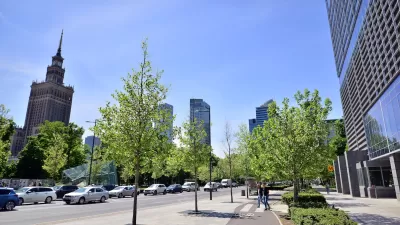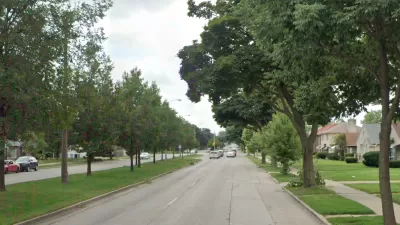The city of Milwaukee is repairing its streets and making them more bike and pedestrian friendly in the process.

Milwaukee is undertaking a large-scale repair and update of its streets according to Dave Schlabowske in Urban Milwaukee. "The repairs are designed to last seven to 10 years, and the city has been able to resurface more than 60 miles of streets," Schlabowske tell us. Most of these streets include bike lanes.
Like many cities in the Midwest, Milwaukee's population has been flat or shrinking for more than 50 years. So many of these streets don’t carry the previous volume of traffic and are in need of modernization. "When an arterial street is resurfaced as part of the rapid fix program, the city evaluates current traffic volumes and is able to make some geometric updates if needed using the new pavement marking patterns. In many cases these roadways were widened decades ago to serve our then growing traffic volumes during Milwaukee’s industrial heyday when thousands of factory workers began driving to work in large factories," Schlaboske reports. These modernizations include making lanes more narrow to reduce speed of cars and to protect pedestrians, as well as adding bike lanes and making other improvements.
Schlabowske, who is involved with the Bike Federation of Wisconsin, says, "We applaud that commitment, but look forward to the first new protected bike lanes, neighborhood greenways network (sometimes called bicycle boulevards, or safe streets) or other next generation bicycle improvements to encourage more people to ride in Milwaukee." I agree.
FULL STORY: City Streets Makeover Adds Bike Lanes

Alabama: Trump Terminates Settlements for Black Communities Harmed By Raw Sewage
Trump deemed the landmark civil rights agreement “illegal DEI and environmental justice policy.”

Planetizen Federal Action Tracker
A weekly monitor of how Trump’s orders and actions are impacting planners and planning in America.

Why Should We Subsidize Public Transportation?
Many public transit agencies face financial stress due to rising costs, declining fare revenue, and declining subsidies. Transit advocates must provide a strong business case for increasing public transit funding.

Understanding Road Diets
An explainer from Momentum highlights the advantages of reducing vehicle lanes in favor of more bike, transit, and pedestrian infrastructure.

New California Law Regulates Warehouse Pollution
A new law tightens building and emissions regulations for large distribution warehouses to mitigate air pollution and traffic in surrounding communities.

Phoenix Announces Opening Date for Light Rail Extension
The South Central extension will connect South Phoenix to downtown and other major hubs starting on June 7.
Urban Design for Planners 1: Software Tools
This six-course series explores essential urban design concepts using open source software and equips planners with the tools they need to participate fully in the urban design process.
Planning for Universal Design
Learn the tools for implementing Universal Design in planning regulations.
Caltrans
Smith Gee Studio
Institute for Housing and Urban Development Studies (IHS)
City of Grandview
Harvard GSD Executive Education
Toledo-Lucas County Plan Commissions
Salt Lake City
NYU Wagner Graduate School of Public Service





























